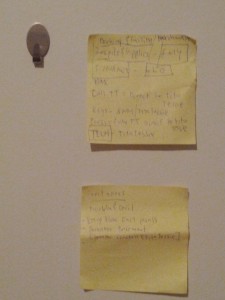Edsel Yu Chua 36172104
“The true picture of the past flits by. The past can be seized only as an image, which flashes up at the instant when it can be recognized and is never seen again”
–Walter Benjamin
Top of the morning, stick with it!
It was a sunny mid-spring day in Vancouver, British Columbia I woke up, did my usual morning routine, having coffee and a smoke contemplating on what my day would be like. I remember the day before there was a discussion in the Immigrant Vancouver Ethnographic Field School class about methods in researching our sites and last Thursday May 17, 2012 was the first-time I configured myself to be an anthropologist for this term. For my volunteer component of my field school, I volunteer in a neighborhood house that helps newcomers, immigrants and temporary foreign workers settle and integrate in multicultural (mind you, not to be confused with intercultural) Canada. The afternoon of my orientation with my supervisor she was discussing my responsibilities as a volunteer front-desk clerk I found myself overwhelmed with the information she was giving me; I was going in and out of focus while she was explaining and suddenly I saw the greatest material a social scientist can have at that point in time laying on the table, a small, bright yellow, and compact pile of post-it notes. “May I have some of those post-it notes and borrow your pen?” are the words that activated my role, reconfigured my senses and trajectory from being an ordinary front-desk volunteer to a social scientist interested in the culture, social organization, structural and systemic construction, social, historical, and political environment of my field-site.
I am, I Post It
Post-it notes function as mobile organizers of thoughts, they can be placed anywhere it sticks, fast, concise, no-nonsense, easy to post and easy to tear-off object where abstract thoughts become material reminders. “I am, I Post-it” serve as a metaphor for my placement this summer, fast, concise, no-nonsense, in and out where abstract thoughts gets materialized in the final project at the end of the term. I enter my field-site and construct my final project using methods such as participant observation, formal and informal interviewing, and a collaborative art-based component with the Filipno/a community in Vancouver with a goal of exploring the culture of balikbayan boxes (boxes filled with gifts and sent to the Philippines by loved-ones that live overseas). As a new volunteer I was given the responsibility to work the front desk of the neighborhood house. I remember the conversation I had with my supervisor as she apologizes for giving me the role of a front-desk clerk, she says that working the front desk “does not fit my qualification”, but starting at the lowest position will give “give me the advantage of learning the ropes as I integrate and work my way to the top” (with my qualifications probably a project director). Personally I was relived that she gave me a mechanical job of sitting down, logging and transferring phone calls, and greeting guests, but the anthropologist in me noticed the underlying narrative of being “new” in a certain place. Being a new front-desk clerk places me in a liminal position of temporariness, and like post-it notes, I can easily be transferred from space to space and my permanence depends on how I stick with my responsibilities, how good I store information and accurate in passing it to others. After my shift I found myself contemplating my responsibility as a front-desk clerk, “I work the front-lines of this place and without me messages will not be received by the higher-ups, I shall do this job to the best of my ability in order for me to move-up in ranks” and I wonder, do other newcomers think and feel this way?


